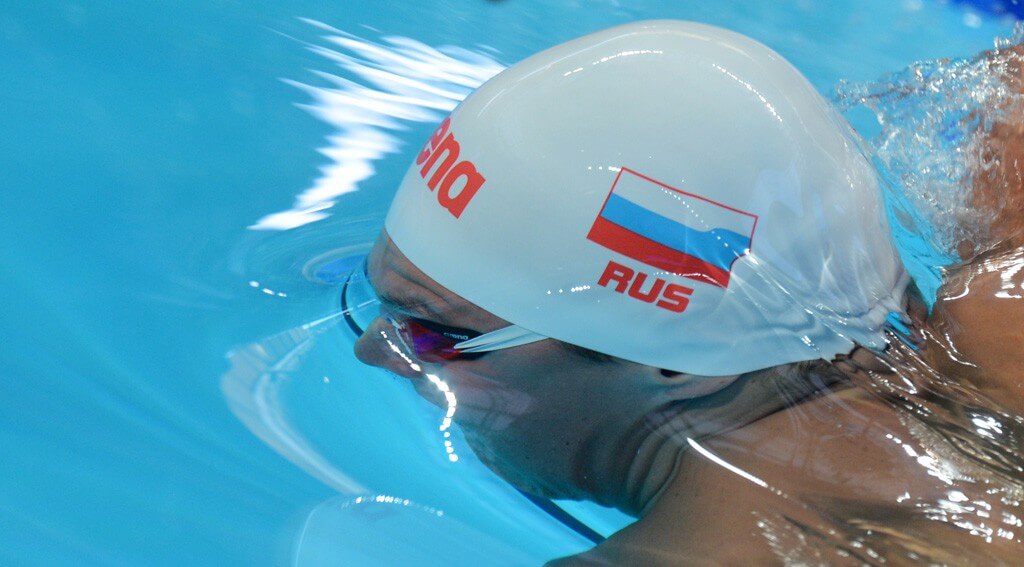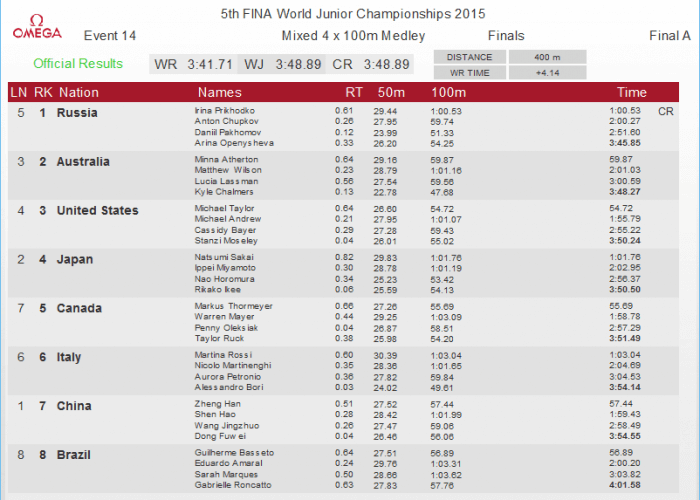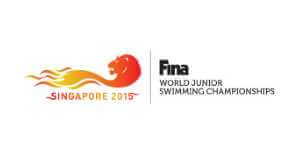Russia Cranks Out World Junior Record in Mixed 400 Medley Relay at 2015 FINA World Junior Championships

Photo Courtesy: R-Sport / MIA Rossiya Segodnya
Left Sidebar
Russia smashed the World Junior and meet record in the mixed 400-meter medley relay at the 2015 FINA World Junior Championships.
Russia’s Irina Prikhodko, Anton Chupkov, Daniil Pakohomov and Arina Openysheva won the finale in 3:45.85. That swim blasted the previous World Junior record of 3:48.89 that also stood as the meet record since 2013.
Australia’s Minna Atherton, Matthew Wilson, Lucia Lassman and Kyle Chalmer finished second in 3:48.27.
USA’s Michael Taylor, Michael Andrew, Cassidy Bayer and Stanzi Mosely snared bronze in 3:50.24.
Japan (3:50.05), Canada (3:51.49), Italy (3:54.14), China (3:54.55) and Brazil (4:01.58) also competed in the final.
2015 FINA World Junior Swimming Championships: Day 2 Finals – Results
SCHEDULED EVENTS
- Men’s 100 back finals
- Women’s 200 fly finals
- Men’s 200 free finals
- Women’s 50 breast finals
- Men’s 100 fly semis
- Women’s 100 free semis
- Men’s 100 breast finals
- Women’s 100 back finals
- Men’s 200 IM finals
- Women’s 800 free finals
- Mixed 400 medley relay finals






Russians must have found the new wonder drug, juniors/ seniors
How late may coaches make adjustments to relay entries?
Whether by illness or event fatigue, Michael Andrew showed that he should not have been on this relay at the end of the session, if adjustments could be made. Coming into the meet no one would question he was deserving of a leg, but this night he was beaten by Taylor in 100 Back, by Whitley in 100 Breast and by Ryan Hoffer in 100 Fly. I’m sure he gave full effort, but with the way he was swimming throughout the session, putting Andrew on the relay was simply cruel both to Michael and to the US squad; the American team would have been better off with Whitley.
I know there is the argument on these Mixed Relays that getting the early lead to avoid waves is beneficial, but at some point you need to simply add numbers. In comparing fastest boy/girl times from this meet or from seedings, if event not yet contested in this meet (and heads up racing, and objective observation of performance, on this night as to Andrew), and measuring the differentials, consider the following (use girls where differential lower and guys where differential higher):
Back
Taylor :54.62 (semis) v Adams 1:00.19 (:59.58 pb) 5.37 diff
Whitley 1:01.00 (final) v Popov 1:08.67 (seed) 7.67 diff
Hoffer :52.89 (semi) v :59.00 Bayer (seed) 6.11 diff
Rooney :48.44 (anchor 4 x 100) v Moseley :55.30 (prelim) 6.86 diff
Making relay start adjustments of either 0.50 or relay swim actually done at meet:
Adams 1:00.16 (time in 100 finals)
Whitley 1:00.50 (was actual 1:00.81 relay split in prelims)
Bayer :58.50 (0.50 off of flat start; actually swam relay final at :59.43)
Rooney :48.44
__________
Total 3:47.60
Interestingly, Bayer was only one who hadn’t yet swum 100 of their stroke in the meet but her mid-:59 split was apparently quite predictable as she had swum the 200 already and was 2 seconds off her best time, roughly equivalent to being 1 second off her 100 seed; putting her in at around 1:00.00 flat start, with Lauren Case seeded at :59.70 (had done 60.3 in prelim relay leg.) So many choices!
Would have still been short of Russia (59 breast and 51 fly hard to combat) but could have been in race with Australia for Silver (could have been fun to see Rooney trying to fend off Chalmers at the end), and possibly 2+ seconds ahead of time they finally did.
Usually at these meets the relay order needs to be submitted before the session starts. When I was at worlds, all relay names were listed on Omega before the sessions started. I think the only way someone could get replaced after submission is for medical reasons. This is probably the case at US nationals, NCAAs, etc.